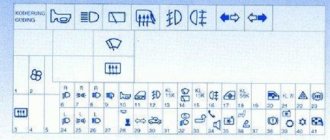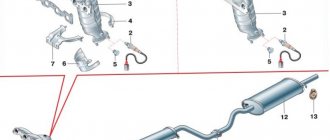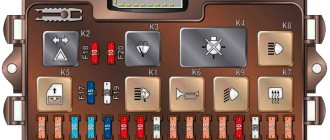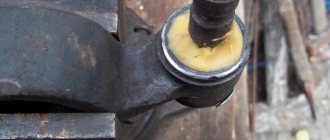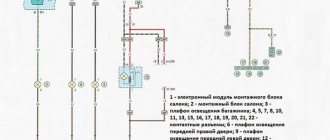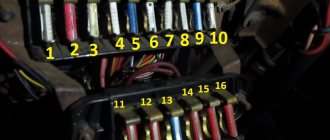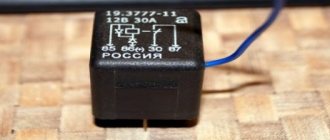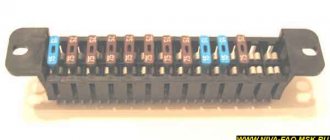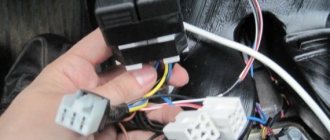Mazda 6 gg (1st generation) was produced in 2002, 2003, 2004, 2005, 2006, 2007 and 2008. During this time, the model was restyled. Delivered all over the world. In China and Japan it is known as Mazda Atenza.
In this publication you will find a description of fuses and relays of the Mazda 6 gg with block diagrams and photos - examples of execution. Let's highlight the cigarette lighter fuse.
The design of the blocks and the purpose of their elements may differ and depend on the year of manufacture, region of delivery (USA, Europe, etc.) and level of equipment.
Description of fuses on a Mazda 6 car: location, diagram, price
In Mazda 6, regardless of the generation GG, GH, GJ, knife-type fuses with a melting element in the center are pre-installed.
Relay-breaker layout diagram
DesignationsWhich is responsible for what / what provides
| K 1 | Electric air conditioning fan |
| K2 | Compressor clutch |
| K 3 | Reserved |
| K 4 | Starter relay |
| K5 | Reserved |
| K 6 | Electronic engine control unit |
| K 7 | Fog lights |
| K 8 | Signal |
| K9 | Heated rear window |
| K 10 | Electrical supply circuit |
| K11 | Fuel pump (gasoline pump) |
| K 12 | Reserved |
| K 13 | Reserved |
| K 14 | headlight washer |
Mazda 6 fuse diagram
Marking / amperageWhat it is responsible for (with description)
| F (F-1) / 30 | Signal |
| F (F-2) / 60 | Reserved |
| F (F-3) / 30 | For headlight washer |
| F (F-4) / 30 | Gasoline pump |
| F (F-5) / 70 | Air conditioning system |
| F (F-6) / 20 | Generator |
| F (F-7) / 20 | Reserved |
| F (F-8) / 30 | Reserved |
| F (F-9) / 40 | ECU |
| F (F-10) / 30 | central locking |
| F (F-11) / 40 | ECU |
| F (F-12) / 30 | Standard cigarette lighter |
| F (F-13) / 40 | Headlight washer module |
| F (F-14) / 40 | Reservation |
| F (F-15) / 30 | Low beam |
| F (F-16) / 20 | Windshield washer module |
| F (F-17) / 20 | Heated rear window |
| F (F-18) / 20 | Reserved |
| F (F-19) / 30 | Stability control (optional) |
| F (F-20) / 25 | Fog lights |
| F (F-21) / 25 | Electric cooling fan |
| F (F-22) / 25 | Hydraulic booster pump |
| F (F-23) / 30 | Power circuits: diagnostic connector, emergency lights, front wiper, glass washer, central locking, dimensions |
| F (F-24) / 30 | Headlights |
| F (F-25) / 30 | RTS electrical circuit |
| F (F-26) / 30 | Reserved |
| F (F-27) / 30 | ABS, stability control |
| F (F-28) / 30 | ABS optional |
| F (F-29) / 30 | Electronic engine control unit |
| F (F-30) / 30 | Reserved |
| F (F-31) / 30 | Ignition switch, starter, additional power circuit |
| F (F-32) / 20 | Starter solenoid relay |
| F (F-33) / 30 | Auxiliary power circuit, ignition |
| F (F-34) / 30 | Reserved |
| F (F-35) / 30 | Air conditioning system |
| F (F-36) / 30 | Reserved |
A set of new original modules starting at 3,000 rubles. High-quality analogues from 2300 – 2500 rubles. Individual fuses from 200 rubles.
Auto parts stores and Mazda 6 disassembly
Below is a list of auto shops and dealerships selling original and non-original interior parts (dashboards, seats, upholstery, etc.) for Mazda 6, new or used. When choosing a store, we recommend focusing on customer reviews and store ratings.
To identify the vehicle and reliably select the Mazda 6 I GG Hatchback fuse box, you should carefully select the vehicle modification. To do this, use clarifying information with data containing: power, measured in horsepower (example 103 hp), engine size (example 1.6 liters), type (example gasoline) and model + engine code, as a rule, this parameter rarely used, but you can only find it in the vehicle title, you can also pay attention to the drive axle (there are rear, front or all-wheel drive), and a mandatory parameter is the release date, which divides the vehicle model into restyling, pre-restyling, first and last year production.
This data serves to uniquely install spare parts during a certain production period, as manufacturers are constantly upgrading cars off the assembly line.
Where are they located?
There are several fuse blocks themselves in a 2006 or 2008 Mazda car. And not for nothing, because modern foreign cars (even starting from 2002) are literally “stuffed” with modern gadgets and other types of equipment. Therefore, protecting all devices is a priority for the fuse box. The protection elements of the washer, cigarette lighter, headlight bulbs, taillight bulbs, fog lights or headlight washer all need reliable protection. Therefore, the company’s engineers decided to introduce several power supplies into the car.
Mazda 6 car
The main power supply is located inside the car, near the driver's seat. To get to it, you need to open the driver's door. In the area of the feet you will be able to see a protective plastic cover, removing which will reveal the salon mounting power supply.
This is interesting: How to remove the steering wheel on a VAZ 2114 with your own hands and replace the steering rack
The second power supply unit, which also contains relays, is located in the engine compartment. If you open the hood and face it, you will see this power supply on the right side. In particular, it is located directly in front of the driver's seat. There is also another block with a relay, the purpose of which will be described below.
Most power supply circuits for vehicle electrical equipment are protected by fuses. Headlights, electric fan motors, fuel pump and other powerful current consumers are connected through a relay. Fuses and relays are installed in mounting blocks, which are located in the engine compartment and interior of the car.
Most fuses are installed in a mounting block located in the engine compartment. Purpose of fuses, fuses and relays in the mounting block located in the engine compartment.
In addition, the fuses are located in the mounting block in the car interior at the end of the instrument panel on the left side. The circuits protected by these fuses.
In the cabin
1) To gain access to the mounting block located in the cabin, press the latch and slide the cover to the side...
2) ...remove it from the end of the lower trim of the front door pillar, overcoming the elastic resistance of the clamps.
Fuse numbers in the mounting block located in the passenger compartment
Circuits protected by fuses installed in the mounting block of the Mazda 6 (GH) interior
| Number | Current strength, A | Protected circuit |
| 1 | 30 | Window lifters |
| 2 | 10 | Adaptive lighting system |
| 3 | 30 | Central door lock |
| 4 | — | Reserve |
| 5 | 7,5 | Instrument panel lighting |
| 6 | 15 | Cigarette lighter |
| 7 | 5 | Electric side mirrors |
| 8 | 15 | Electric outlet |
| 9 | — | Reserve |
| 10 | — | Reserve |
| 11 | 15 | Engine management system |
| 12 | 5 | Safety system |
| 13 | 15 | Dashboard |
| 14 | — | Reserve |
| 15 | 20 | Windshield wiper and washer |
| 16 | 10 | Air conditioning compressor |
| 17 | 10 | Tailgate wiper and washer |
| 18 | 15 | Interior lamps |
In the engine compartment
1) To gain access to the mounting block located in the engine compartment , press the cover latch...
2) ...and remove the cover.
Numbers of fuse links, fuses and relays in the mounting block located in the engine compartment
Circuits protected by fuses and relays installed in the mounting block of the Mazda 6 (GH) engine compartment
| Number | Current strength, A | Protected circuit |
| Relay | ||
| R1 | A/C compressor relay | |
| R2 | Main relay | |
| R3 | Low beam relay | |
| R4 | Starter relay | |
| R5 | Horn relay | |
| R6 | Tail lights | |
| R7 | Fuel pump relay | |
| R8 | Electric outlet | |
| R9 | Engine cooling fan low speed switch | |
| R10 | ||
| R11 | High beam relay | |
| R12 | Engine Cooling Fan High Speed Relay | |
| R13 | ||
| R14 | Rear window defroster relay | |
| R15 | Starter relay | |
| R16 | Front fog lamp relay | |
| R17 | — | |
| R18 | Heater relay | |
| Circuit breakers | ||
| 1 | 40 | Heater |
| 2 | 40 | — |
| 3 | 30 | Electric windows |
| 4 | 40 | Engine starting system |
| 5 | 40 | Electrical circuit protection |
| 6 | 60 | Anti-lock braking system |
| 7 | 30 | Engine cooling fan |
| 8 | 20 | AUX HEATER |
| 9 | 30 | Engine cooling fan |
| 10 | 50 | PRECRASH |
| 11 | 40 | Rear window defroster |
| 12 | 40 | Electric seat adjustment |
| 13 | 10 | Air conditioning system |
| 14 | 15 | Electric outlet |
| 15 | DIECER | |
| 16 | — | |
| 17 | 15 | Electric sunroof |
| 18 | 20 | Electric seat heating |
| 19 | 15 | Interior equipment control unit |
| 20 | 25 | Audio system |
| 21 | 20 | headlight washer |
| 22 | 15 | Fog lights |
| 23 | 25 | Electric door lock |
| 24 | — | |
| 25 | — | |
| 26 | 5 | Brake lights |
| 27 | 15 | Sound signal |
| 28 | 5 | Engine management system |
| 29 | 10 | Turn signals and hazard warning lights |
| 30 | — | — |
| 31 | 10 | Electronic steering lock system |
| 32 | 10 | Engine management system |
| 33 | — | — |
| 34 | 40 | Electrical circuit protection |
| 35 | — | |
| 36 | GLOWSIG | |
| 37 | — | |
| 38 | 7.5 | Electrically heated mirrors |
| 39 | 30 | Anti-lock braking system and stabilization system |
| 40 | 15 | Right low beam headlights |
| 41 | 15 | Left low beam headlight bulb |
| 42 | 10 | Right high beam headlight lamp |
| 43 | 10 | Right low beam headlights |
| 44 | 15 | Injectors |
| 45 | 20 | Gasoline pump |
| 46 | GLOW | |
| 47 | 10 | Engine management system |
| 48 | 10 | Injectors |
This is interesting: How to disassemble the headlight on a Passat B5 with your own hands?
PSU with relay under the hood
You can find another power supply with a relay in the engine compartment, in the place shown in the diagram.
As for the purpose of the links:
| Part number | Purpose |
| 1 | Main fuse of the unit. |
| 6 | This relay is designed to protect the circuit of the second electric fan of the cooling system. |
| 7 | Steering wheel signal circuit protection device. |
| 8 | This component protects the circuit of the third cooling fan. |
| 9 | A device that protects the starter wiring of a machine. |
| 10 | The fourth cooling system fan. |
| 11 | Link of a dynamic low-frequency device. |
| 12 | Ensures the functionality of the mechanism designed to heat the rear window. |
| 13 | The device protects fog lamp bulbs from overvoltage. |
| 14 | Responsible for the functioning of the climate system, in particular the air conditioner. |
| 15 | The main element of this power supply. |
| 16 | This part provides protection for the headlight bulbs. |
| 17 | Responsible for the operation of the machine's dimensions. |
| 18 | The first fan of the cooling system. |
| 19 | A device that protects the headlight washer mechanism. It should be noted that in Mazda cars of 2006 and 2008 releases, the headlight washer link is weak, as it often fails. For the headlight washers, original fuses should be used to avoid frequent failure. |
| 20 | The device of the fog lamp circuit. |
| 21 | A mechanism designed to ensure the operation of the heating system fan. |
| 22 | This component is one of the most basic. He is responsible for the operation of the gasoline pump. If it fails, starting the engine will be impossible. Therefore, if you are faced with the problem of a non-working engine, you need to first check the fuel pump relay. |
Mazda 6 seat heating does not work
When the seat heating is on, a minute is enough to feel the warmth coming from the heating parts from under the upholstery. But one small breakdown calls into question the driver’s comfortable well-being during winter trips. Before you begin repairing heated seats, you need to know about the reasons that cause this malfunction.
Heated front seats (optional equipment)
So, there are only three possible circumstances that cause the heating to burn out: Sometimes, in some car models, seat heating becomes very unreliable. The normal functioning of the seat heating depends on the correct selection of the studio.
Therefore, before diagnosing the device itself, it is necessary to check the fuse. The standard F33 is rated at 15 amps. This device is mounted in a block, which is usually installed at the bottom of the panel where the driver’s seat is.
If the light bulbs do not work, you need to change them. What you need, be prepared for the fact that the chair will have to be taken out of the car and disassembled. Of course, there are cases when it is desirable to resolve everything without a workable disassembly version, if, for example, the cable has failed - there is no way to do without this, the heated seats of the Mazda 3 do not work. In accordance with the instructions, the oil in the automatic transmission of a Mazda 6 car does not need to be changed at all.
But reality indicates something completely different. The automatic transmission does not reach its intended service life and fails even earlier.
Experts believe this is due to the oil. Mazda 6 Gh 2.
You need to entrust this function to the specialists of the technical center, you can save a certain amount of currency and change the oil in the Automatic transmission for another Mazda manual transmission. I took it apart, everything was clean inside, there was no water ingress, nothing burned anywhere.
After connecting it to the connector and trying to put it into action, the configurations did not work out, it doesn’t even buzz. Although if you throw it directly at the battery, it starts working.
Heated seats
To remove a heated seat switch that is not working, first remove the connector. In most car models, it is quite a bit to rock the element and pull it.
Unfortunately, be careful, some car brands install unique types of fasteners. To release the stoppers you need to reach inside the casing with a screwdriver. Later, make some efforts so that the part does not work, the heated seats of the Mazda 3 outward. There will be three contacts here. It is required to measure the resistance on 2 sides. The middle contact is responsible for the light bulb.
If the resistance is the same in all positions of the adjustment wheel, check the contacts.
Maybe there was some grease in there. Under these circumstances, clean them and everything should work fine. Often the reason why the driver's seat heating does not work is due to a break in the heating element.
There is an option to check the functionality of this part of the structure without removing the chair, but thin and experienced fingers will be useful for this purpose, the method itself consists of the following steps: RTS on a mobile I haven’t written anything for a long time, I decided to provide a short report, in case it comes in handy for someone So, a long time ago my light bulb burned out illumination of the heated seat button, I decided to remove it to see if it was true.
Sanchala thought that it was not worth writing about this in detail in the blog, but then I thought, what if the heated seats of the Mazda 3 don’t work? It will still come in handy, so I’ll describe the process, it’s very easy to remove: We disassemble the central tunnel, it’s very simple - drag the plastic lining up by opening the glove compartment and unscrewing the gearshift knob.
Then unscrew the 2 screws securing the ashtray and pull it out, actually 3. Disconnect all the terminals, then press the ears with a screwdriver and your finger in the place indicated by the arrow and push the button out.
Next, we take out the light bulb, the heated seats of the Mazda 3 do not work, pull it out with a thin screwdriver or something flat, insert it into the groove of the light bulb socket and turn it counterclockwise, then take out the light bulb.
Reasons for fuses failure on Mazda 6
- Failure to comply with technical inspection regulations,
- Purchase and installation of non-original components
- Unprofessional installation
- Mechanical damage to the mounting block, accident, impact, collision,
- Violation of the integrity of the insulating layer of electrical wiring,
- Short circuit in the circuit,
- Loose terminal contacts,
- Oxidation of terminals,
- Formation of condensation, moisture ingress into the mounting block,
- Manufacturing defect.
This is interesting: Causes of iveco edc error: why does the light come on?
Replacing fuses on a Mazda 6
Preparatory stage: no tools are needed, since there is no need to unscrew anything.
Sequencing:
- We place the Mazda 6 on the platform, block the rear wheels with wheel chocks, and squeeze the parking brake;
- To replace modules in the cabin, you need to open the front passenger door. On the right side of the central channel there is a technological hatch;
- Carefully open it and look at the layout of the modules. We remove the fuse by serial number. The location diagram is indicated on the back of the cover;
- We check the current indicator (amperage) with the data specified in the instruction manual.
Note to the driver!!! It is unacceptable to install fuses with higher or lower current strength. In both cases, this will lead to failure of the equipment that is assigned to the module.
- If you need to replace the entire mounting block in the cabin, you will need a Phillips head screwdriver. We unscrew two screws, disconnect the contacts from the board, remove it from its regular place;
- We carry out preventive maintenance, replace worn elements with new ones, and assemble the structure in the reverse order.
Algorithm for replacing relay switches in the engine compartment of a Mazda 6 car
- Open the hood, stop the engine, remove the power terminals from the battery;
- On the right side under the hood, closer to the frill, there is a mounting block with power relays;
- We remove the faulty element, having first checked the location according to the diagram indicated on the back of the plastic cover.
We install new modules, close the lid, check that the units are working properly, and start the engine.
The average service life of fuses is 45 thousand km.
Notes:
When replacing blown fuses on a Mazda 6, always use only original parts of the same rating, otherwise you may damage the vehicle's electrical system.
If the electrical equipment fails, first check whether the electrical fuses in the indoor unit are good.
If the headlights or other electrical equipment do not work, and you are sure that all fuses located in the interior unit are working, then check the fuses in the engine compartment.
Recommendations for servicing the mounting block
- Check the condition of the fuses periodically and replace them with new ones as necessary.
- After long trips through puddles or in the rain, check for moisture and condensation in the mounting block. Dry the board with a stream of compressed air,
- If the mechanism suddenly stops functioning, do not rush to replace it with a new one. Check the module status, use a multimeter to diagnose.
Despite the simplicity of the design of the mounting block, carry out diagnostic work at a service station. Unprofessional intervention in repairs leads to undesirable consequences.
Mazda 6 seat heating does not work
When winter sets in, the issue of heated seats comes to the fore. No driver wants to sit on an icy chair and wait for it to warm up from human body heat.
When the seat heating is on, it takes a few minutes to feel the heat coming from the heating elements underneath the upholstery. But one small breakdown casts doubt on the driver’s comfort during his winter trips.
Before you begin repairing the seat heating, you need to find out the reasons that cause this malfunction. Here are the circumstances that cause burnout, and maybe three only:
- faulty fuse;
- breakdown of the heating tape inside the structure;
- control panel on another switch located in the seat.
Sometimes in some cars the heated seats become very unreliable. As a rule, this applies to economical cars. It is enough to “step” on the seat with your knee and a fracture occurs. Despite this, expensive cars such as the Jaguar in the other Lexus do not have these problems, but inexpensive Citroens and Renaults often have unreliable heating strips.
The normal functioning of seat heating depends on the correct choice of studio, on how the vehicle’s on-board network works. Therefore, you should check the fuse before diagnosing the device itself.
The standard F33 is rated at 15 amps. This unit is installed in a unit that is usually installed at the bottom of the driver's seat panel. If the light is not working, changes need to be made.
What you need, be prepared for the chair to be pulled out of the car and disassembled. Of course, of course, when it is desirable to solve everything without the correct disassembly version, for example, if the cable has failed, you will not do without this procedure.
Installation of heated seats Mazda 6
We will repair heated seats that are not working, using the Citroën C4 Picasso as an example.
To test the switch, it must be removed. On a theoretical level, this will be done without removing the chair. However, in reality, something like this is rarely implemented. However, there are some difficulties associated with the transition to some models. Therefore, by removing this part directly in the salon, you risk destroying the skin and the device itself.
To remove a heated seat switch that doesn't work at first, first remove the connector. In most car models, the element wobbles a little and pulls down. Unfortunately, be careful, some car brands install unique types of fasteners.
To compress the plugs, you need to reach inside the housing with a screwdriver. Make a little effort later to get the part. There will be three contacts. It is necessary to measure the resistance on both sides. The middle contact is responsible for the light bulb.
If the resistance is the same in all positions of the adjustment wheel, check the contacts. Perhaps it was lubricant. Under these conditions, clean them and everything should work fine.
Often the reason why the driver's seat heater does not work is due to a broken heating element. You can check the functionality of this part of the structure without removing the chair, but it is useful for thin and experienced fingers; the method consists of the following steps:
- Bend your back strongly.
- Insert your hand into the gap between the backrest and the seat.
- Try pressing to find the backrest fastenings. They are usually located left and right of center and one down.
- Remove the nozzle.
By performing these simple manipulations, you need to remove two connectors for heated seats that do not work. If there is a desire, there is an opportunity to take what remains for our client three. Just push the latches up. Just pull down.
Remove the connectors and check them. In this context, the power of resistance itself is not so fundamental. Just his mother. During testing, the following contacts must be checked:
- two contacts on the back;
- four per pillow;
- two last and two minor.
If you find the location where the failure occurred, you can easily repair the heating that is not working.
When repairing heated seats, it will be useful to remove the chairs themselves. In fact, it's not as hard as you might initially think. Simply unscrew the four bolts and disconnect the connector that secures the chair to the base.
There is a seat belt attached to one end of the seat, which is not heated. You will need to put some effort into disabling this device. To do this you will need to disassemble it.
The plastic seat belt cover is attached to special star bolts. They have protrusions and you need a special screwdriver to remove them. In particular, removing the cover is a major challenge and after that, just follow these steps:
- remove the clamping bar;
- unlock the latch;
- remove the belt buckle.
Then remove the items from the frame. Be careful not to damage the seat heater that is not working.
Mazda 6 door stop repair
To remove the cushion, loosen the clamps and clips along the edges. The lumbar support for seat heating must also be removed. Unfortunately, without this process the device works.
It is also necessary to remove the handle responsible for tilting the backrest. When you separate the non-working cushion from the chair, you can easily repair it. The process can be divided into the following stages:
- Remove the right lining from the top.
- Remove the plastic housing.
- Remove your elbow.
- Remove the straps holding the backrest in place.
- Remove the headrest.
- Pull back.
If you forced our client to leave the items listed, you can work on the seat heating element.
Then take the Teflon cable and replace the damaged section. To begin with, you still need to think about trimming the ends of the wires and tinning them. Combine the resulting structure and put on a special cembroke.
After repairing the seat heating, please check if there is any contact with our customer before reassembling. Only later can the chair be restored to its original form. Glue is necessary for reassembly and the foam must be glued with it.
Every driver can fix faulty heated seats. The main thing is to be patient and spend time on diagnostics and dismantling. For beginners, this procedure takes 5-6 hours, for a specialist. about 2.

